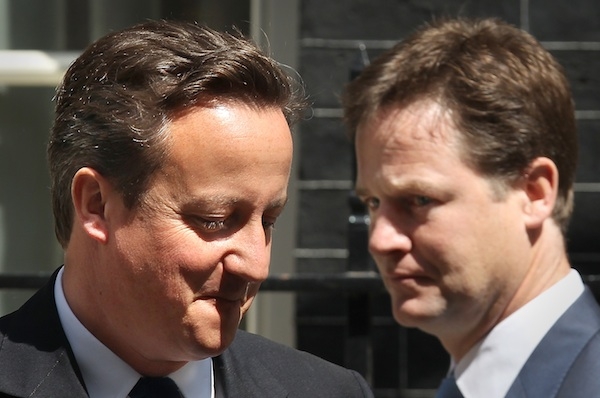You know things really are difficult in the coalition when neither side is badmouthing the other. These days, when those around David Cameron and Nick Clegg bite their tongues, it tends to be because one jibe might bring down the coalition.
Since 24 July, everyone has been on best behaviour. Over dinner that evening, Cameron and George Osborne told Clegg and Danny Alexander that Lords reform was off: they could not persuade enough Tory backbenchers to support it. The Liberal Democrat duo replied that, if this was so, their MPs would not vote for the boundary changes the Conservatives so dearly want.
But the icy civility of recent days can’t disguise the fact that the coalition — indeed, the idea of coalition government — is in big trouble. When the boundary review is complete, the Prime Minister and the Deputy Prime Minister will walk into different lobbies to vote on a piece of government business. One of the oldest certainties in British politics will have gone. Cabinet collective responsibility will have collapsed. Both sides are adamant that this vote will be a one-off. But once ministers have walked through different lobbies, they find it easier to do so again. And it’s tough to sustain a coalition when the leaders are no longer in control of their parties.
It is hard to exaggerate what a blow to the Cameroons the Liberal Democrats withdrawing support for boundary changes is. One told me on Monday that he ‘couldn’t see how the Conservative party could ever win a majority again’. Reducing the number of parliamentary seats to 600 and redrawing the boundaries were crucial to the Conservative strategy at the next election. They had planned to target three types of seats: Labour ones they should have picked up on the national swing last time; ones where the Liberal Democrats are vulnerable; and new marginals created by the boundary review. Wiping out the third category makes it harder for the Conservatives to win any sort of majority, let alone one of 40 to 50 seats, which is what they think Cameron would need to be confident of making it through a whole parliament.
Many Tory MPs find Cameron’s emphasis on boundary reform depressing. ‘They don’t seem to think they can win an election by persuading people,’ one senior backbencher told me recently. But to the Cameroons, who in 2010 saw seven-point lead over Labour fail to yield a majority, the changes are critical. That’s why they are pressing on with them despite the damage it will do to the coalition.
Were the boundary review to be thwarted, Cameron would face a big strategic choice. He could conclude that he was no longer likely to win a majority; in which case the priority would be to make the coalition work and keep Clegg in place. Any other Liberal Democrat leader would rather do a deal with Labour. Or he could decide that a majority was still possible given more boldness on the economy, reform and Europe. His circle is split on which course to take.
Complicating their thinking is the question of what the party will accept. The growing support for Boris Johnson among Conservative donors, commentators and even MPs is evidence of dissatisfaction with the current leadership. Despite not even being in parliament, Johnson is turning into the prince over the water. He has been invited to address the 1922 Committee of Tory MPs in September. The subject? How to win an election. His reception then will tell us a lot about whether Tory backbenchers really can see him as a leader or whether all the speculation is just Olympic high spirits.
Perhaps the best proof that Johnson’s stock is on the rise is that camp followers of the Prime Minister have taken to whispering into people’s ears about the Mayor’s weaknesses. ‘If the answer is Boris, it’s some question,’ said one, summing up the mood.
Inside the parliamentary party, the feeling even among those loyal to Cameron is that, to be secure as leader, he will have to be Prime Minister of a purely Conservative government after the next election. There is a clear feeling against another coalition: the party would far prefer minority government and then another election.
No. 10 is aware, though, that the biggest single influence on the mood of the party — the country, for that matter — is the economy. So Cameron intends to fill the hole left in the coalition’s legislative programme by the failure of Lords reform with economic measures. This legislation, being called the Jobs Bill in No. 10, will be made up of three parts: deregulation, infrastructure and industrial strategy. The precise composition of the bill is being hammered out. But the decision to include deregulation is recognition that attempts to make departments deregulate their own sectors have failed.
I also understand that Cameron is now persuaded that the coalition must do more to reform the planning system. He wants to revise the National Planning Policy Framework agreed in the spring. Some ministers may resist. Those who oppose more change argue that planning is not the problem, that there are more than 300,000 sites with planning permission not currently being developed. Eric Pickles, the Communities Secretary, thinks that one of the reasons developments have stalled is that councils made planners agree to community benefit schemes during the boom times that are now unaffordable. He now intends to send in mediators to break this logjam.
Beyond the economy, Cameron’s biggest challenge is to show the country what he stands for, what kind of Prime Minister he wants to be. As one No. 10 insider puts it, ‘He’s got to decide who he is.’ This autumn, the real Mr Cameron must stand up.






Comments